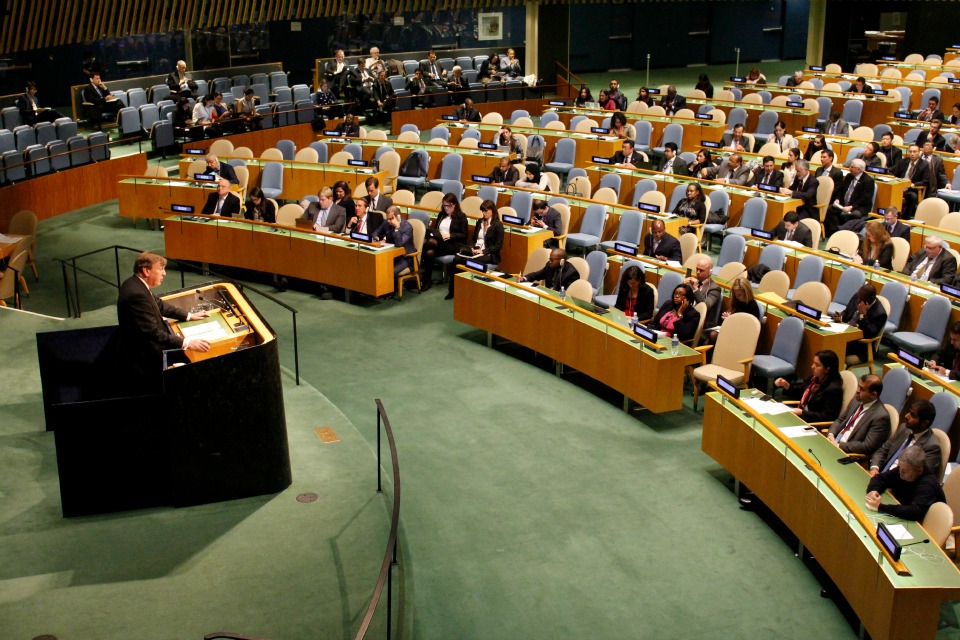"The WSIS review has been a major step forward in our common goal to build an Information Society for all."
Statement by John Whittingdale, UK Secretary of State for Culture, Media and Sport at the UN General Assembly High-Level Meeting on the World Summit of the Information Society (WSIS)

Thank you Mr. President
Your Excellencies, ladies and gentlemen,
It is an honour for me to represent the United Kingdom at the conclusion of the ten-year review of the World Summit on the Information Society.
WSIS is a crucial agenda for the United Kingdom. This review is a major step forward in our shared aim to build a people-centred, inclusive and development-oriented Information Society.
It is an agenda built on the inseparable links between access to ICTs, the protection of human rights and social and economic development across the globe.
The UK has played a leading role in the evolution of ICTs - from the early development of telegraphy and the first submarine cables, to the work of the Marconi Company in radio-communications in my own area of Chelmsford. And that pioneering work continues, from the invention of the World Wide Web by Sir Tim Berners-Lee, right up to the development of 5G mobile.
The revolutions in technology we have seen over recent years have transformed business, public services and access to information, education and culture. They are transforming the lives of billions of people for the better.
We need to make sure that these benefits reach every corner of the world.
Investment by the private sector, and governments, has delivered enormous progress in the last 10 years. 3.2 billion people are now online.
But there is more to do to close the digital divide. Four billion people worldwide remain offline – most of them in developing countries, and a disproportionate number of them, women.
That is why the UK has emphasised throughout the review that we must make an explicit link between WSIS and the 2030 Sustainable Development Agenda.
In the UK we have kept our pledge on overseas aid by enshrining into the law the UN’s target of spending 0.7 per cent of gross national income on development aid.
Many of the development programmes we fund are driven by information and communication technology.
But for development to be truly sustainable, investment alone is not enough. We must also create an enabling environment.
That is why we are pleased that the WSIS review emphasises the importance of competition, proportionate taxation and independent and non-discriminatory regulation.
But governments cannot achieve the Information Society alone. That is why the multi-stakeholder approach – which brings together, governments, the private sector, civil society, the technical community and academia – is so vital.
Our experience in the UK has demonstrated the critical importance of multi-stakeholder approaches. Whether it’s the rollout of superfast broadband to every UK citizen or keeping our children safe online, we have found that working together brings the best results.
And let me be clear. ICTs do bring new challenges. As we become more dependent on ICTs so we need new solutions to ensure networks are open and secure.
A year ago, the Prime Minister of the UK, David Cameron, convened the first WePROTECT Summit in London. Industry, governments and other organisations came together, united by a determination to treat child sexual abuse as a global crime requiring a global response. A multi-stakeholder approach to a serious challenge that affects us all.
Our resolve to combat child sexual abuse is mirrored in our resolve to tackle the use of ICTs for other harmful activities - from harassment to crime to terrorism.
A vital part of digital literacy is learning how to stay safe online. In the UK we are helping parents make choices about what their children can access and giving them filtering tools to protect them.
We are looking at the best ways to require age verification for some types of harmful content and at ways to tackle illegal online gambling, to prevent piracy and to protect personal data.
And we are investing £1.9 billion in cyber security over the next 5 years.
But Governments cannot successfully tackle these issues working in isolation. If we are to achieve the WSIS vision, then all stakeholders need to play their part.
I would like to conclude by talking about freedom. As the Minister in Britain for culture and media and telecoms, I know that societies thrive when there is access to information, an independent media to hold the powerful to account, the freedom for people to express their opinions and freedom for cultural expression.
But in many parts of the world, serious threats remain to freedom of expression and plurality of information.
Online censorship, restrictions on social media, and efforts to restrict civil society, are all undermining human rights.
Journalists live in fear of attack, intimidation, politically motivated persecution and arbitrary libel suits. And because the Internet has made millions of people citizen-journalists, these new activists and bloggers are also under threat.
The UK calls on all countries to protect and promote human rights and fundamental freedoms.
That is why we consider one of the major achievements of this review the affirmation that human rights apply online as they do offline.
Without that foundation, we will not be able to realise the potential of ICTs for global sustainable development.
In conclusion, the WSIS review has been a major step forward in our common goal to build an Information Society for all.
That goal should not only be measured by economic development and the spread of ICTs, but also by progress towards the realisation of human rights and fundamental freedoms and the opportunity for every individual to fulfill their potential.
Our work has just begun. Let’s now move on to get the next four billion people online.
Thank you.